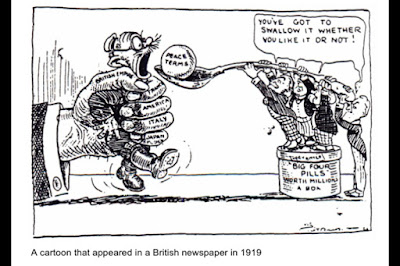Consider, the great
majority of the people of England have never had a Parliament of England.
The meetings
of the 13th Century that gave rise to one in England were for the Peers and a
Commons who were the Knights of the Shires and the Burgesses of the then major
boroughs elected by small numbers of their own standing. This system lasted
with minor changes etc. until the 19th Century.
By the time
the franchise was extended to the lower orders in the late 19th and early 20th
Centuries and Parliament reformed, it had become the Parliament of the United
Kingdom. It had men, later women from across the Atlantic Isles. In our present
arrangements while there is devolution to Wales, Northern Ireland and Scotland,
there is none for England.
For the UK,
the First World War with all its consequences, notably The Treaty Of Versailles
of 1919, meant that it had many formal obligations and duties to other states
that affected both the powers it had and how far it might act alone. This was
alongside The British Empire developing in many places to a condition of interplay
of interests rather than absolute rule.
After World
War Two and a new tranche of world bodies, treaties and mutual aid systems and with
some close integration, together with the financial effects, the UK was
beholden to many others. The end of Empire complicated this and left many
uncertainties. These led to joining the EEC, later the EU.
In the House
of Commons, most seats are from England and in the House of Lords most peers have
some sort of English origin, but this does not mean they speak for England.
They speak for their party and to a great extent the lobbyists, corporations
and bodies who pay best. This is one of the fruits of globalisation. Whether it
is sweet or sour is open to debate.
When the
Scottish National Party claim "independence" from London, sadly they
cannot have it. Because it is not for London to give. All London can give is some
residual powers and bits and pieces of authority that are not conditioned by
other obligations.
Anything else
must be conceded and agreed by the relevant world and other bodies with which
the UK has been engaged for some time. But their removal, along with the
Scottish MP's, could allow more say for purely English interests, in particular
those counties and cities which have been the losers in competing with Scotland
for money and assistance.
I suspect that
in England there are ordinary people, especially in the more diverse
communities that are now the norm in many parts, who will be glad to see the
Scots go.



They have a funny way of showing it...
ReplyDeletehttps://www.indy100.com/article/eu-brexit-indyref-referendum-scotland-uk-petitions-backfired-quite-beautifully-7382956
If only William Paterson, 1658-1719, had stayed on his parents farm and stuck to turnips or oats.
Delete